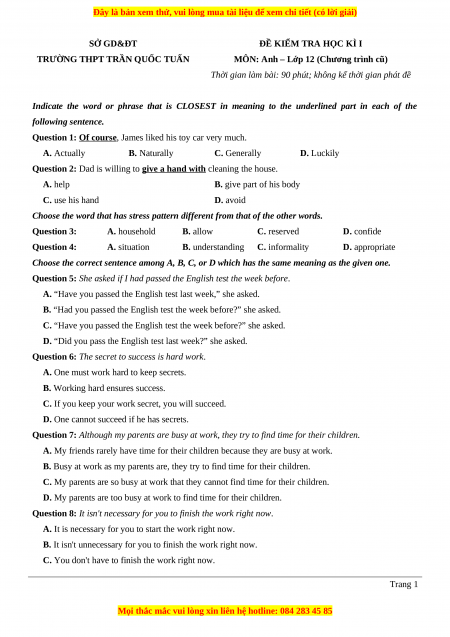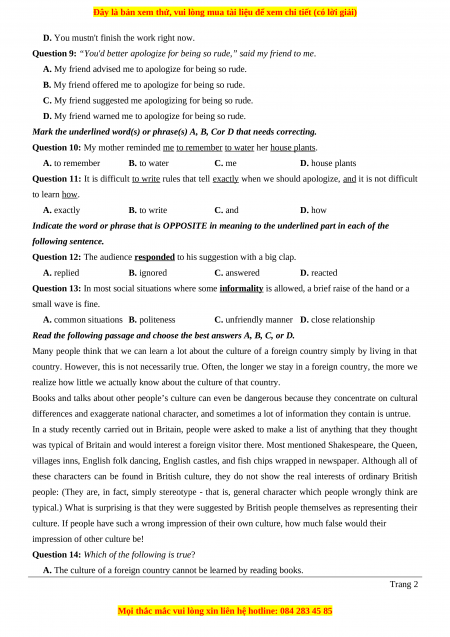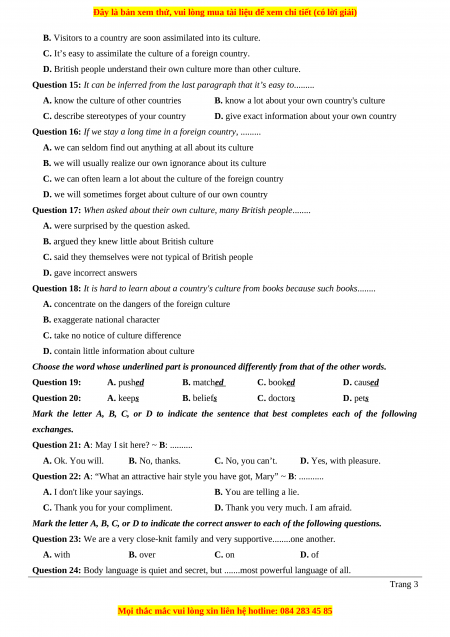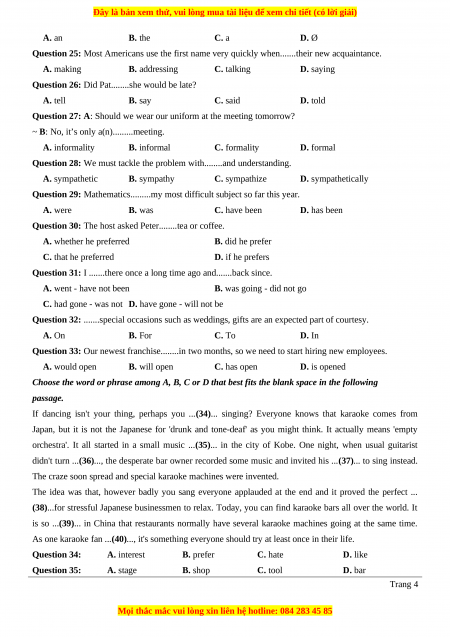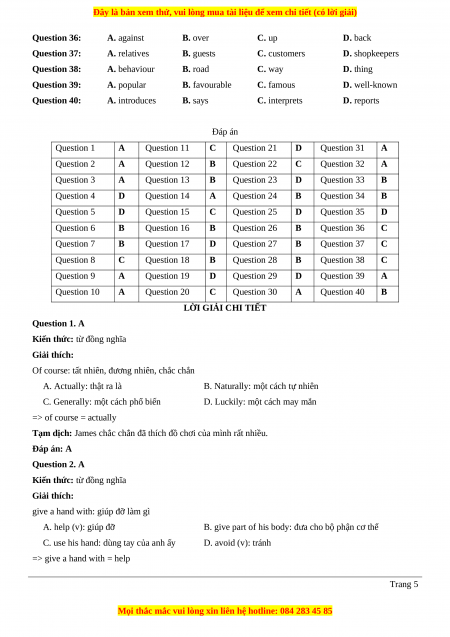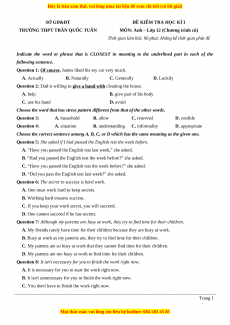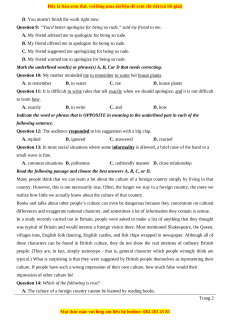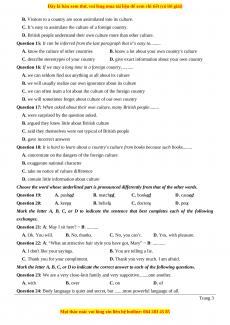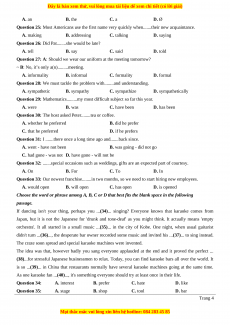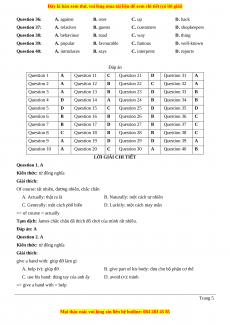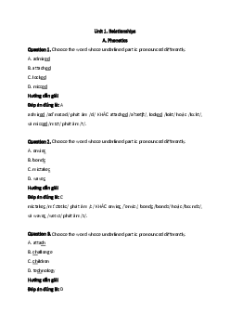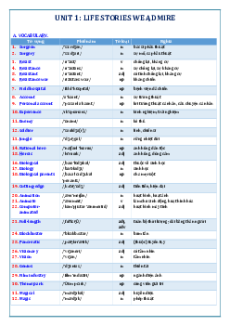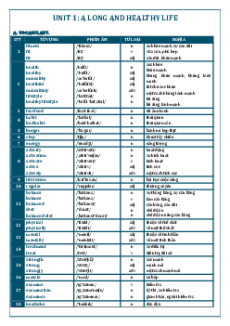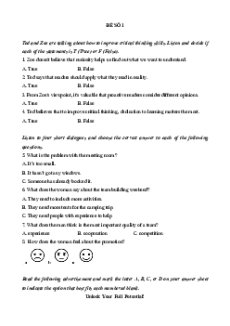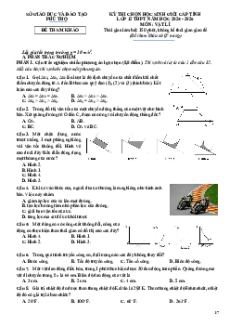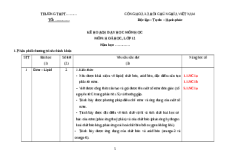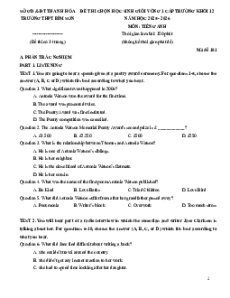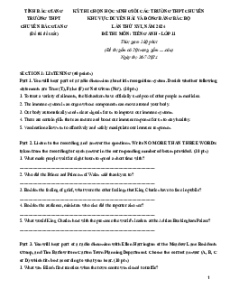SỞ GD&ĐT
ĐỀ KIỂM TRA HỌC KÌ I
TRƯỜNG THPT TRẦN QUỐC TUẤN
MÔN: Anh – Lớp 12 (Chương trình cũ)
Thời gian làm bài: 90 phút; không kể thời gian phát đề
Indicate the word or phrase that is CLOSEST in meaning to the underlined part in each of the
following sentence.
Question 1: Of course, James liked his toy car very much. A. Actually B. Naturally C. Generally D. Luckily
Question 2: Dad is willing to give a hand with cleaning the house. A. help
B. give part of his body C. use his hand D. avoid
Choose the word that has stress pattern different from that of the other words. Question 3: A. household B. allow C. reserved D. confide Question 4: A. situation B. understanding C. informality D. appropriate
Choose the correct sentence among A, B, C, or D which has the same meaning as the given one.
Question 5: She asked if I had passed the English test the week before.
A. “Have you passed the English test last week,” she asked.
B. “Had you passed the English test the week before?” she asked.
C. “Have you passed the English test the week before?” she asked.
D. “Did you pass the English test last week?” she asked.
Question 6: The secret to success is hard work.
A. One must work hard to keep secrets.
B. Working hard ensures success.
C. If you keep your work secret, you will succeed.
D. One cannot succeed if he has secrets.
Question 7: Although my parents are busy at work, they try to find time for their children.
A. My friends rarely have time for their children because they are busy at work.
B. Busy at work as my parents are, they try to find time for their children.
C. My parents are so busy at work that they cannot find time for their children.
D. My parents are too busy at work to find time for their children.
Question 8: It isn't necessary for you to finish the work right now.
A. It is necessary for you to start the work right now.
B. It isn't unnecessary for you to finish the work right now.
C. You don't have to finish the work right now. Trang 1
D. You mustn't finish the work right now.
Question 9: “You'd better apologize for being so rude,” said my friend to me.
A. My friend advised me to apologize for being so rude.
B. My friend offered me to apologize for being so rude.
C. My friend suggested me apologizing for being so rude.
D. My friend warned me to apologize for being so rude.
Mark the underlined word(s) or phrase(s) A, B, Cor D that needs correcting.
Question 10: My mother reminded me to remember to water her house plants. A. to remember B. to water C. me D. house plants
Question 11: It is difficult to write rules that tell exactly when we should apologize, and it is not difficult to learn how. A. exactly B. to write C. and D. how
Indicate the word or phrase that is OPPOSITE in meaning to the underlined part in each of the
following sentence.
Question 12: The audience responded to his suggestion with a big clap. A. replied B. ignored C. answered D. reacted
Question 13: In most social situations where some informality is allowed, a brief raise of the hand or a small wave is fine.
A. common situations B. politeness
C. unfriendly manner D. close relationship
Read the following passage and choose the best answers A, B, C, or D.
Many people think that we can learn a lot about the culture of a foreign country simply by living in that
country. However, this is not necessarily true. Often, the longer we stay in a foreign country, the more we
realize how little we actually know about the culture of that country.
Books and talks about other people’s culture can even be dangerous because they concentrate on cultural
differences and exaggerate national character, and sometimes a lot of information they contain is untrue.
In a study recently carried out in Britain, people were asked to make a list of anything that they thought
was typical of Britain and would interest a foreign visitor there. Most mentioned Shakespeare, the Queen,
villages inns, English folk dancing, English castles, and fish chips wrapped in newspaper. Although all of
these characters can be found in British culture, they do not show the real interests of ordinary British
people: (They are, in fact, simply stereotype - that is, general character which people wrongly think are
typical.) What is surprising is that they were suggested by British people themselves as representing their
culture. If people have such a wrong impression of their own culture, how much false would their
impression of other culture be!
Question 14: Which of the following is true?
A. The culture of a foreign country cannot be learned by reading books. Trang 2
B. Visitors to a country are soon assimilated into its culture.
C. It’s easy to assimilate the culture of a foreign country.
D. British people understand their own culture more than other culture.
Question 15: It can be inferred from the last paragraph that it’s easy to.........
A. know the culture of other countries
B. know a lot about your own country's culture
C. describe stereotypes of your country
D. give exact information about your own country
Question 16: If we stay a long time in a foreign country, .........
A. we can seldom find out anything at all about its culture
B. we will usually realize our own ignorance about its culture
C. we can often learn a lot about the culture of the foreign country
D. we will sometimes forget about culture of our own country
Question 17: When asked about their own culture, many British people........
A. were surprised by the question asked.
B. argued they knew little about British culture
C. said they themselves were not typical of British people
D. gave incorrect answers
Question 18: It is hard to learn about a country's culture from books because such books........
A. concentrate on the dangers of the foreign culture
B. exaggerate national character
C. take no notice of culture difference
D. contain little information about culture
Choose the word whose underlined part is pronounced differently from that of the other words. Question 19:
A. pushed
B. matched
C. booked D. caused Question 20: A. keeps
B. beliefs
C. doctors D. pets
Mark the letter A, B, C, or D to indicate the sentence that best completes each of the following exchanges.
Question 21: A: May I sit here? ~ B: .......... A. Ok. You will. B. No, thanks. C. No, you can’t. D. Yes, with pleasure.
Question 22: A: “What an attractive hair style you have got, Mary” ~ B: ...........
A. I don't like your sayings.
B. You are telling a lie.
C. Thank you for your compliment.
D. Thank you very much. I am afraid.
Mark the letter A, B, C, or D to indicate the correct answer to each of the following questions.
Question 23: We are a very close-knit family and very supportive........one another. A. with B. over C. on D. of
Question 24: Body language is quiet and secret, but .......most powerful language of all. Trang 3
A. an B. the C. a D. Ø
Question 25: Most Americans use the first name very quickly when.......their new acquaintance. A. making B. addressing C. talking D. saying
Question 26: Did Pat........she would be late? A. tell B. say C. said D. told
Question 27: A: Should we wear our uniform at the meeting tomorrow?
~ B: No, it’s only a(n).........meeting. A. informality B. informal C. formality D. formal
Question 28: We must tackle the problem with........and understanding. A. sympathetic B. sympathy C. sympathize D. sympathetically
Question 29: Mathematics.........my most difficult subject so far this year. A. were B. was C. have been D. has been
Question 30: The host asked Peter........tea or coffee.
A. whether he preferred B. did he prefer C. that he preferred D. if he prefers
Question 31: I .......there once a long time ago and.......back since.
A. went - have not been
B. was going - did not go
C. had gone - was not D. have gone - will not be
Question 32: .......special occasions such as weddings, gifts are an expected part of courtesy. A. On B. For C. To D. In
Question 33: Our newest franchise........in two months, so we need to start hiring new employees. A. would open B. will open C. has open D. is opened
Choose the word or phrase among A, B, C or D that best fits the blank space in the following passage.
If dancing isn't your thing, perhaps you ...(34)... singing? Everyone knows that karaoke comes from
Japan, but it is not the Japanese for 'drunk and tone-deaf' as you might think. It actually means 'empty
orchestra'. It all started in a small music ...(35)... in the city of Kobe. One night, when usual guitarist
didn't turn ...(36)..., the desperate bar owner recorded some music and invited his ...(37)... to sing instead.
The craze soon spread and special karaoke machines were invented.
The idea was that, however badly you sang everyone applauded at the end and it proved the perfect ...
(38)...for stressful Japanese businessmen to relax. Today, you can find karaoke bars all over the world. It
is so ...(39)... in China that restaurants normally have several karaoke machines going at the same time.
As one karaoke fan ...(40)..., it's something everyone should try at least once in their life. Question 34: A. interest B. prefer C. hate D. like Question 35: A. stage B. shop C. tool D. bar Trang 4
Đề thi học kì 1 Tiếng anh 12 năm 2022 - 2023 (Đề 23)
CÁCH MUA:
- B1: Gửi phí vào TK:
1133836868- CT TNHH DAU TU VA DV GD VIETJACK - Ngân hàng MB (QR) - B2: Nhắn tin tới Zalo VietJack Official ( nhấn vào đây ) để xác nhận thanh toán và tải tài liệu - giáo án
Liên hệ ngay Hotline hỗ trợ: 084 283 45 85
Đề thi được cập nhật liên tục trong gói này từ nay đến hết tháng 6/2023. Chúng tôi đảm bảo đủ số lượng đề đã cam kết hoặc có thể nhiều hơn, tất cả có BẢN WORD, LỜI GIẢI CHI TIẾT và tải về dễ dàng.
Để tải tài liệu gốc về máy bạn click vào nút Tải Xuống ở trên!
Thuộc bộ (mua theo bộ để tiết kiệm hơn):
-
Tailieugiaovien.com.vn giới thiệu bộ 21 đề thi học kì 1 môn Tiếng Anh lớp 12 mới nhất năm 2022 - 2023 nhằm giúp Giáo viên có thêm tài liệu tham khảo ra đề thi Tiếng anh lớp 12.
-
File word có lời giải chi tiết 100%.
-
Mua trọn bộ sẽ tiết kiệm hơn tải lẻ 50%.
Đánh giá
4.6 / 5(535 )Trọng Bình
Giúp ích cho tôi rất nhiều
Duy Trần
Rất thích tài liệu bên VJ soạn (bám sát chương trình dạy)
TÀI LIỆU BỘ BÁN CHẠY MÔN Tiếng Anh
Xem thêmTÀI LIỆU BỘ BÁN CHẠY Lớp 12
Xem thêmTài liệu bộ mới nhất





